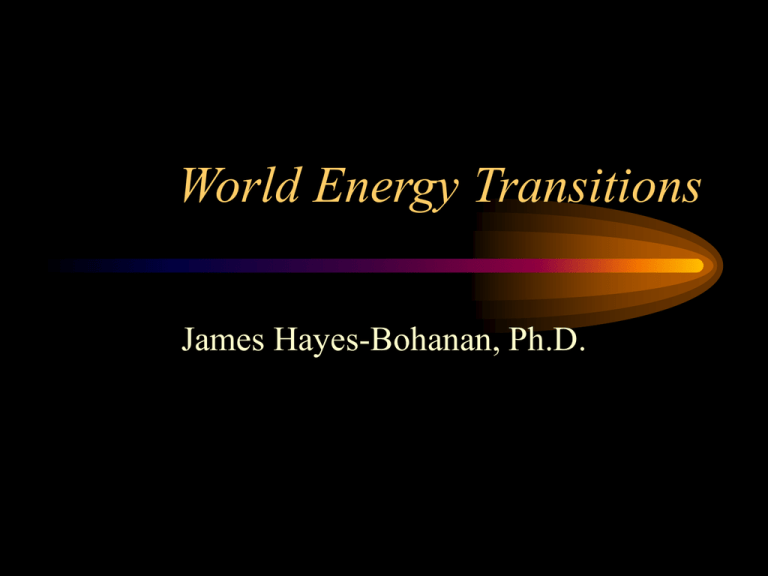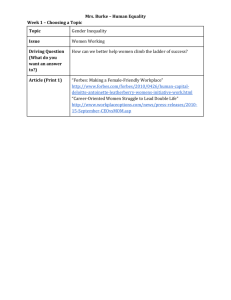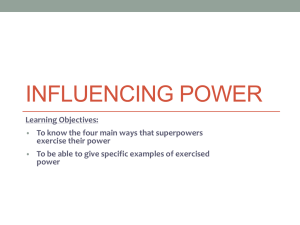World Energy Transitions
advertisement

World Energy Transitions James Hayes-Bohanan, Ph.D. Considerations • • • • • Kinds of energy Patterns of energy use Sources of energy The future of energy No “magic bullets” for sale here! Kinds of energy • • • • Perpetual Renewable Non-renewable Conservation Historic energy use in U.S. Cutter and Renwick, 1999. Major commercial sources of energy • Fossil Fuels – Coal – Oil – Natural Gas • Nuclear • Hydroelectric Major Coal Reserves Major Oil Reserves Gulf Petroleum Exports Energy Policy Considerations in the Aftermath of September 11 Philip K. Verleger, Jr. http://www.ase.org/stars/pdf/pverleger.pdf Petroleum dependence Analysis from Forbes What is at stake in Saudi Arabia: http://www.forbes.com/forbes/2001/1112/064_print.html Ten-dollar gasoline?: http://www.forbes.com/forbes/2001/10/2201022oilcosts_print.html Patterns of trade: http://www.forbes.com/static_html/oil/oil.shtml Nuclear Cycles Note dfferences between current and “future” pathways. U.S. Vehicle Fuel Efficiency Energy Policy Considerations in the Aftermath of September 11 Philip K. Verleger, Jr. http://www.ase.org/stars/pdf/pverleger.pdf U.S. Car/Truck Mix Energy Policy Considerations in the Aftermath of September 11 Philip K. Verleger, Jr. http://www.ase.org/stars/pdf/pverleger.pdf The future of energy • • • • • Global National State and regional Institutional Individual Global scale • • • • Resource limitations Climate change Other environmental harm Geopolitics National scale - imported oil • • • • • • Slow rate of overall economic growth Increase taxes on imported oil Encourage conservation Promote domestic alternatives Region-specific incentives Strategic petroleum reserves Energy Policy Considerations in the Aftermath of September 11 Philip K. Verleger, Jr. http://www.ase.org/stars/pdf/pverleger.pdf National scale - longer term • The previous list simply “buys time” while alternatives are found. • According to Verleger, “after 2015, the United States and other major consumers may have to admit that the resource base outside the Middle East is insufficient.” • Therefore, the policies focused on “energy independence” are not useful long-term: Post-petroleum policies are needed. Post-petroleum technologies • • • • Wind Solar Tides Fuel Cells State and regional scale • Electricity deregulation – Price – Air-quality – Promoting alternatives • Government as consumer • Mass-transit and highway decisions Institutional scale • Energy Bear! • Information systems • ROI: Return on Investment Individual scale • • • • • Motivation Consumption choices Geographic choices Technology choices: ROI Reduce, reuse, recycle, repair Utility facts Under energy deregulation, consumers may have greater control over the energy choices made on their behalf Further information • Environmental Geography web site at http://webhost.bridgew.edu/jhayesboh • Energy education page (choose “Energy” from drop-down menu) • Includes this presentation and citations






